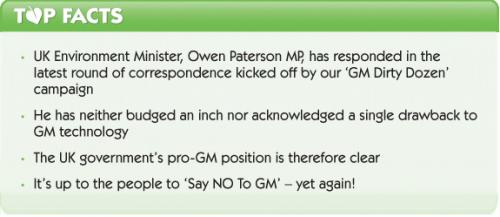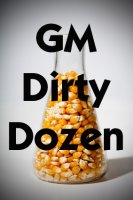If Environment Minister, Owen Paterson MP, were to get his way, the latest round of correspondence between his office and ANH-Intl might be the last. That’s because, in his letter to ANH’s Dr Rob Verkerk, he made clear that we may “agree to disagree” and let the matter drop. Unfortunately, it seems that Mr Paterson may be underestimating the determination of ANH and its supporters to see a genetic modification (GM)-free Europe. Simply, we will not let this matter rest.

Avoiding the issues
We think that a government minister who has recently announced a policy with momentous implications for the UK should at least attempt to address the scientific opposition to that policy. However, having observed Mr Paterson’s response to the ‘GM Dirty Dozen’, we noted that, “Mr Paterson chooses not to refute [our] arguments, preferring instead merely to provide several references that purport to show beneficial effects of GM crops. His response gives little indication that he has read any of the reports he cites, or indeed the references we provided in our ‘GM Dirty Dozen’.”
The unsustainability of GM
Nothing has changed in his latest letter to Dr Verkerk of ANH-Intl. This time, Mr Paterson relies on a single source of information: a report by the European Academies Science Advisory Council (EASAC), entitled Planting The Future. Mr Paterson quotes a section from the report that reads: “The production of more food, more sustainably, requires the development of crops that can make better use of limited resources. Sustainable agricultural production and food security must harness the potential of biotechnology in all its facets.”
Just as in his previous response, there is no indication that Mr Paterson, or his advisors who are likely to be involved in the penning of the letter, has seriously examined any of the evidence provided – particularly regarding the status of GM as a ‘sustainable’ technology. Just to recap from our previous articles:
- Through outcrossing between wild and GM varieties, GM is a significant threat to biodiversity [1,2]
- Despite the biotech industry’s assertions of the ‘precision’ of GM techniques, the creation of GM plant varieties involves haphazard insertion of DNA ‘cassettes’ into the host genome, using potentially dangerous viral fragments.
EASAC embraces biotech arguments
A closer look at the EASAC’s Planting The Future reveals a document as unashamedly pro-biotech as any Monsanto executive. Its major conclusions, and our comments, can be found here.
Who’s oversimplifying?
Mr Paterson was actually being coy about the extent to which the EASAC report lionises GM: it provides what we suspect is a ‘road map’ for development of the GM sector by the European Commission and allied governments. At no point has he even acknowledged that valid concerns exist over GM. Mr Paterson presents a united front with Prof Anne Glover and the UK government’s Chief Scientific Advisor, Sir Mark Walport.
Mr Paterson studiously ignores the huge amount of contradictory evidence, along with the views of respected scientists like Dr Michael Antoniou of King’s College London. Also overlooked are academic ecologists, whose work ideally equips them better than any other academic group to advise on the multi-generational effects of GM. In the face of their wholly one-sided arguments, the positions of Paterson, Walport and Glover – and by extension, the UK government – are deeply unscientific and very poorly considered.
Bearing all this in mind, eyebrows were raised in the ANH-Intl office when Mr Paterson accused us of, “Trivialis[ing] the Government’s position”. We’d love to report that the UK government has taken our concerns seriously, but it hasn’t. And as for it being, “Simply wrong to suggest that the Government is part of some biotech industry propaganda or misinformation campaign,” we note his government has not responded to reports of collusion between it and biotech – and Mr Paterson’s recent announcement of precisely the initiatives they discussed.
Who’s behind the EASAC report?
The working group that developed the report was hand-picked by EASAC, which, its website informs us, “Is formed by the national science academies of the EU Member States”. Planting The Future heavily stresses EASAC’s independence: “The academies work together to provide independent, expert, evidence-based advice about the scientific aspects of public policy...Its views are vigorously independent of commercial or political bias.” So why does such an independent, scientifically respectable body come to a pro-GM position that is apparently devoid of any nuance?
One clue comes from the ‘Séralini affair’. Members of the august national scientific academies that comprise EASAC climbed over each other to discredit Prof Gilles-Eric Séralini et al’s now-infamous paper. The French Academie des Sciences, for example, joined forces with five other French academies to slam Séralini et al. Similar criticisms were made by German, Belgian, Danish, Dutch and Italian scientific authorities, all of which are undoubtedly affiliated with their national academies and therefore EASAC. Furthermore, as GMOSeralini.org points out, “Government agencies...are not disinterested parties, since they have been responsible for authorizations of GM NK603 maize and Roundup”.
Conflicts of interest
And what are we to make of authors with obvious GM industry connections? Prof Ian Crute is an ex-Director of Rothamsted Research , the GM research institute where Mr Paterson gave his June speech. Dr Ewen Mullins is a researcher at Irish semi-government authority Teagasc, which carries out GM field trials. Jörg Romeis was at the centre of controversy over GM studies designed to overlook toxicity to non-target beneficial insects. And a quote by Prof Joachim Schiemann gives an inkling of the prevailing attitudes among members of the European Food Safety Authority’s GMO Panel: “Of course, studies that describe potential negative environmental effects of GMOs are discussed particularly intensively.”
Conclusion
Clearly, Mr Paterson isn’t going to change course in a hurry. That he turns a deliberately blind eye to any and all scientific evidence that contradicts his position is an enormous red flag that the motivations behind the GM push are political, rather than scientific. But we believe the British public, whom Mr Paterson is meant to serve, will not be fooled so easily – and may be highly offended by their Environment Minister’s high-handed and deceptive manner over GM. We wonder whether Mr Paterson’s Shropshire North constituency will be quite so safe at the next UK election.
Call to action
- There is now little doubt that the arguments put forward by Owen Paterson MP represent the UK government’s firm position on GM. We think the government’s position is transparent, unscientific and insulting to the UK electorate, not to mention disastrous for the environment and human and animal health. Please share this article widely, via blogs, email and social media, and ensure that biotech misinformation is challenged wherever it arises.
References
- Garcia MA, Altieri MA. Transgenic Crops: Implications for Biodiversity and Sustainable Agriculture. Bull Sci Technol Soc, 2005; 25: 335-353. [Abstract]
- IAASTD, Agriculture at a crossroads, 2008, Island Press, USA.








Comments
your voice counts
10 October 2013 at 8:38 pm
Keep up the good work, the Alliance for Natural Health, representing our best interests, as usual.
10 October 2013 at 9:37 pm
Owen Paterson announced his support for GM food saying 'babies would die' without it, directly AFTER the annual Bilderberg meeting, which was held this year in June in the UK at the Grove Hotel in Watford, where Monsanto would have definitely attended along with the world's top corporations and government leaders. This is where they set world policy. I just don't think that was a coincidence. There were some pretty interesting and top people who spoke at the fringe event but not even the BBC were allowed up to the actual conference, much to their own amazement and all the mainstream press had to congregate in a field at the end of the hotel drive with the alternative media! ANH, pity you weren't there. After all, nothing is more political than health.
Your voice counts
We welcome your comments and are very interested in your point of view, but we ask that you keep them relevant to the article, that they be civil and without commercial links. All comments are moderated prior to being published. We reserve the right to edit or not publish comments that we consider abusive or offensive.
There is extra content here from a third party provider. You will be unable to see this content unless you agree to allow Content Cookies. Cookie Preferences